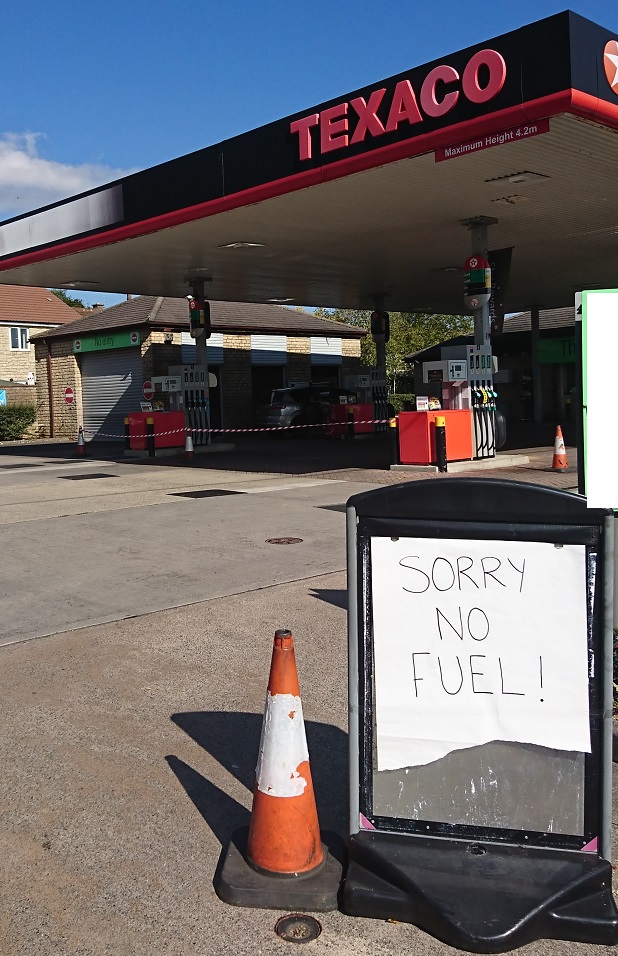The UK Fuel Crisis-20210925
https://www.humantruth.info/20210925-uk_fuel_crisis.html
By Vexen Crabtree 2021
 Panic-buying at UK petrol stations has led to widespread shortages and closures1,2, and long queues causing traffic disruption. This is the latest in a stream of panics centred on UK supply-chain shortages which have seen months of issues getting hold of imported wood, food, chemicals, food, medical equipment, gases and various supplies. The public reaction has made things worse, but is caused by the lack of confidence that the Government have conducted any planning for the shortages of workers. Within an open labour trading bloc, sudden shifts in demands for workers can be easily met by tasking workers from one place to another: but in the post-Brexit environment of "British workers only" there is no quick fix to the labour shortage. Also, after multiple decades of gradual defunding of public transport, most workers have no alternative but to use personal cars. The solutions to these problems require fundamental changes to core UK government policy.
Panic-buying at UK petrol stations has led to widespread shortages and closures1,2, and long queues causing traffic disruption. This is the latest in a stream of panics centred on UK supply-chain shortages which have seen months of issues getting hold of imported wood, food, chemicals, food, medical equipment, gases and various supplies. The public reaction has made things worse, but is caused by the lack of confidence that the Government have conducted any planning for the shortages of workers. Within an open labour trading bloc, sudden shifts in demands for workers can be easily met by tasking workers from one place to another: but in the post-Brexit environment of "British workers only" there is no quick fix to the labour shortage. Also, after multiple decades of gradual defunding of public transport, most workers have no alternative but to use personal cars. The solutions to these problems require fundamental changes to core UK government policy.
1. The Loss of Open Labour Markets Makes the UK Slow to Adapt to Changes in Skills Requirements
#eu #eu_benefits #uk #uk_fuel_crises #uk_infrastructure
After leaving the EU, the UK has found itself with major shortfalls of staff in catering, hospitality, farming and haulage. Some of these issues were seen coming: in 2019 the Government's Brexit department published a report saying that "approximately 8 out of every 10 lorries in UK roads is an EU haulier"3, roaming freely between EU national boundaries. The loss of truck drivers has caused a rolling series of outages, closures and goods deficits, including the fuel crisis of September 2021, which has seen most petrol stations closed, lacking fuels, or enforcing rationing1,2. The surge in demand for truck drivers would normally be met easily by large supply firms by simply tasking workers from throughout the EU, but this simple measure is now unavailable to UK companies, meaning that responses to temporary surges in requirement simply cannot be met in a timely manner.
For more, see:
Months after the crisis in deliveries began affecting supermarket shelves and tradesmen, the UK's government decided it needed a freer flow of workers, and declared that it would issue 5000 visas for truck drivers, and 5500 for food industry workers, to allow them to enter from the EU, until Christmas4. But the small number of these visas and the speed with which they can be made effective simply means they're not going to make much of an impact.
The president of the British Chambers of Commerce said, in its typically understated manner, that the numbers are "insufficient", although she did add that that it was like "throwing a thimble of water on a bonfire"4. Likewise, the Confederation of British Industry (CBI), representing 190 000 businesses, said the scope of the visas was too limited. The Road Haulage Association (RHA) found the shortage of drivers to number over 100 0005, whilst the trade body Logistics UK told Government ministers in August that the shortage of HGV drivers was at 90,000, and it welcomed the 5000 visas, as did the executive of the UK's Food and Drink Federation4.
These remediations should have been enacted the moment that the UK closed its borders with the EU, rather than after multiple months of skills shortages. In 2019, a collection of investigators found that in the UK "approximately 8 out of every 10 lorries in UK roads is an EU haulier"3, roaming freely between EU national boundaries in their business - losing such ties was going to cause a predictable loss in supply chain dynamism. And who were those researchers? The UK's Government's own Department for Exitting the EU3 - since then, the Government appears not to have taken its own research into account. Before the pandemic, the shortage was at 60,000 drivers5; but nevertheless, two years later, the Government's transport secretary, Grant Shapps, thinks that "we're taking these steps at the earliest opportunity"6. The "earliest opportunity" to plan for the loss of labour flexibility seems to have been half a decade ago, when the UK voted to leave the EU, not in 2021, in the midst of a crisis.
Unfortunately, the signs are not very promising that many want to return to the UK; Brexit has left a bitter taste in the mouth of many previously happy workers. Also, the UK Pound has lost value against the Euro5., making UK work less worthwhile.